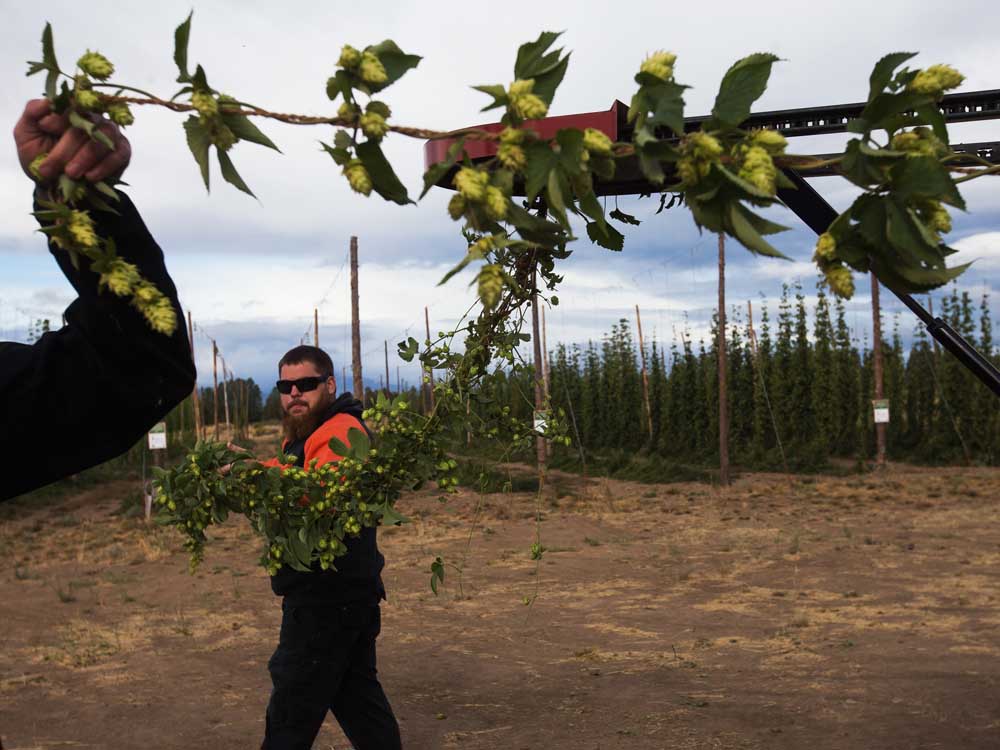Hop convention coming to Bend
Published 1:08 pm Wednesday, May 24, 2017

- Wild Ride Brewing’s Fred Searles, left, and Kasey McCullough feed hop vines into a hop harvester in September at Cascade Hop Farm in Tumalo. The 61st annual American Hop Convention begins in Bend on Tuesday.(Joe Kline/Bulletin file photo)
Andrew Bloo will be present, he said, when the 61st annual American Hop Convention opens for the first time in Bend next week at the Riverhouse on the Deschutes.
“We will be in attendance,” said Bloo, owner with his wife, Tracy Bloo, of Cascade Hop Farm LLC. “A lot of Pacific Northwest hop farms are large and, by their nature, have their own support system. But for smaller farms, it’s a great opportunity for us to really share our experiences as a group, to come together as a group and also learn from the large farms the processes they use and how we can use that on a small scale.”
Trending
The American Hop Convention runs Tuesday through Jan. 20 and expects about 500 attendees, said Michelle Palacios, secretary-treasurer of the Oregon Hop Growers Association. Oregon hosts the convention — which primarily draws attendance from the Pacific Northwest but also attracts growers from the Midwest and East — every three years, the last time in Portland, she said.
“We wanted to bring it to Bend to spotlight the great beer in Bend and in Central Oregon,” Palacios said.
The Riverhouse, the largest convention space east of the Cascades with its 221-room hotel, can accommodate half the expected guests at best, said Amanda Miller, a Riverhouse sales associate. Nearby hotels, including the Bend Inn & Suites and Shilo Inn Suites Hotel, benefit from the overflow.
“Bring it on — the more, the merrier,” said Pat Burrus, Shilo Inn director of sales.
Conventioneers, in addition to seminars on pest management, hop herbicides and hop aromas in beer, will hear lunch presentations from MillerCoors and Molson Coors executives on Jan. 19 and the following day from Gary Fish, founder of Deschutes Brewery.
Also on tap is an evening reception Jan. 19 at Crux Fermentation Project. And each attendee will receive a 22-ounce bottle of a beer brewed collaboratively for the event by brewers including Robin Johnson, Deschutes Brewery & Public House assistant brewmaster, and Larry Sidor, Crux head brewer, at the Boneyard Beer brewery.
Trending
Hop farming is big in the Northwest, where Oregon in 2016 produced $65.1 million worth of the crop, second to Washington, which produced $382.2 million worth, according to the National Agricultural Statistics Service. Idaho, the third-largest hop-producing state, grew $51.1 million in hops that year. The value of hops grown last year exceeded the 2015 crop value by $152.4 million, according to the statistics service.
However, hop farming remains a small business in Central Oregon, where the acreage is measured in single digits and the plants in hundreds, rather than thousands. Miles Wilhelm, who grows hops at the Smith Rock Hop Farm, in Terrebonne, said that operation has about 900 plants on three acres. Last year, the farm sold about 350 pounds of hops, “so we have a long way to go,” he said.
Hop plants are hardy, aggressive plants, but getting them to produce flowers with the characteristics that brewers desire is the tricky part, said Bloo. Bitter hops were the trend until tastes started to shift toward more aromatic varieties, Wilhelm said.
Gary Wyatt, owner with his wife, Susan Wyatt, of Tumalo Hops Co., said hops need about 120 days of sunshine to mature, which Central Oregon lacked until a climate shift produced more sunny days, and a better environment for hops, he said. The Wyatts started growing hops 10 years ago from scratch.
“There was no information at all on this side of the mountains,” Gary Wyatt said. “We learned everything we needed to know about hops on our own, through trial and error.”
Bloo, alone among the local hop growers interviewed Wednesday who said he’s actually planning to attend the convention, said he sees it as an opportunity to showcase small, Central Oregon hop farms.
“We’re not here to compete on a 1,000-acre perspective. I’m here to put my own hands in the soil to produce a crop in a very limited supply,” he said. “We touch every plant, every season. It’s pride in the product for us.”
— Reporter: 541-617-7815, jditzler@bendbulletin.com








